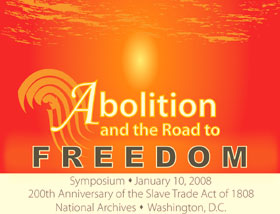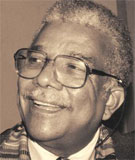200th Anniversary of the Slave Trade Act of 1808
The Slave Trade Act of 1808, passed by Congress in March of 1807, became effective January 1, 1808. On January 10, 2008 the Center for the National Archives Experience held a day-long symposium to commemorate its 200th anniversary and raise awareness of the slave trade, its abolition, and its impact on United States history and culture.

Abolition and the Road to Freedom is presented by the Center for the National Archives Experience and the Foundation for the National Archives in partnership with the Bicentennial Committee for the abolition of the Slave Trade, the National Museum of African American History and Culture; Howard University; the New York Public Library’s Schomburg Center for Research in Black Culture; and the National Archives Afro-American History Society.
The symposium was generously supported by the Foundation for the National Archives, the Ford Foundation, Howard University, and the Schomburg Center for Research in Black Culture.



